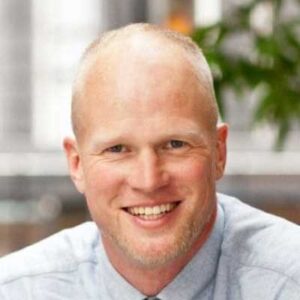
"Do not underestimate how the health of men and boys enriches the health and well-being of women and children."
David Kuhl PhD
Co-Founder Blueprint
- Date
Fatherhood – The Hidden Key to Leadership Excellence
posted in Fatherhood & Men's Health

Adam Kreek
Fatherhood isn't just about bedtime stories—it's professional development in disguise.
For years, I’ve championed men’s health and personal growth as a Big Brother mentor, an executive coach, and a father to three incredible kids. Through these roles, I’ve observed a profound truth: great fathers often make the best leaders.
Recently, I had a conversation with Dr. David Kuhl, co-founder of Blueprint, an organization that transforms male-oriented workplaces by fostering better leaders, mentors, and fathers. Blueprint’s work is vital because, as Richard Reeves and the American Institute for Boys and Men emphasize, many men today feel left behind in our rapidly evolving world. In his book Of Boys and Men, Reeves highlights several key statistics that illustrate the challenges men face in today's society:
- Educational Attainment: In 1970, 20% of men aged 25 to 34 had a bachelor's degree, compared to 12% of women—a gap favoring men by eight percentage points. By 2020, this trend reversed: 41% of women in this age group held a bachelor's degree, while only 32% of men did, creating a nine percentage point gap favouring women. Brookings Institution
- Mental Health: The suicide rate for men is four times higher than for women, with a significant increase among younger men since 2010. Skeptic
- Labour Market Participation: Employment rates among Black men are lower than those of white men, white women, and Black women, indicating significant disparities in labour market participation. Skeptic
Fatherhood, however, offers a powerful counterbalance—a Trojan horse for personal transformation, health, and professional growth.
Fatherhood: The Leadership Lab
Fatherhood isn’t just a personal journey; it’s an unparalleled training ground for leadership. As a dad, you’re a mentor, mediator, coach, and role model all rolled into one. You learn to:
- Prioritize effectively: Every dad knows the art of juggling work, family, and personal health. Balancing competing priorities sharpens decision-making skills.
- Build emotional intelligence: Strong relationships with children, especially daughters, correlate with better resilience and emotional intelligence. Research shows daughters of involved fathers are less likely to struggle with body image issues and more likely to excel in adulthood.
- Practice patience and empathy: Guiding a child through their fears, joys, and challenges teaches skills directly transferable to the workplace.
The Midlife “Values Reset”
Fatherhood often coincides with critical life transitions. Men progress through phases I like to call baby, builder, boss, and finally, beacon. Each phase brings a crisis of purpose or values realignment. Fatherhood accelerates the transition from builder to boss—instilling the confidence to lead others—and later, from boss to beacon, where a man becomes a mentor for the next generation.

Life as a man can be divided into four distinct stages: Baby, Builder, Boss, and Beacon, each marked by growth, challenges, and evolving priorities. As shown in the illustration, responsibility, physical capacity, and wisdom define a man’s journey. Responsibility rises sharply in the Builder and Boss stages, then declines as men transition into Beacon, while physical capacity peaks during Builder and declines with age. Wisdom, however, grows steadily across all stages, reaching its height in Beacon. Each transition presents a crisis: the Rising Crisis asks how to reach full potential; the Ascending Crisis challenges men to manage growing responsibilities and privilege; and the Illuminating Crisis confronts the need to find fulfillment in wisdom despite reduced abilities and influence. Navigating these crises helps men grow from action-oriented builders to reflective, legacy-focused beacons of wisdom and guidance.
Healthier Fathers, Better Leaders
Here’s the secret: fatherhood pushes men to improve their health. Becoming a dad often inspires better habits—less drinking, more exercise, and greater focus on longevity. The result? Healthier fathers become more focused and resilient leaders. Studies even show that committed dads earn more and contribute more to their communities and workplaces.
A Call to Action
Fatherhood is an opportunity, not a limitation. It’s the crucible in which men are transformed into compassionate, patient, and effective leaders. By embracing this role fully—at home and in the boardroom—we create stronger families, healthier communities, and better businesses.
Start today. Be a father who leads. A leader who fathers. And leave a legacy that resonates beyond profits and titles.
The world doesn’t need more bosses. It needs more dads.
Read part 2 of this blog, where we dig into sex, silent struggles and practical steps forward.